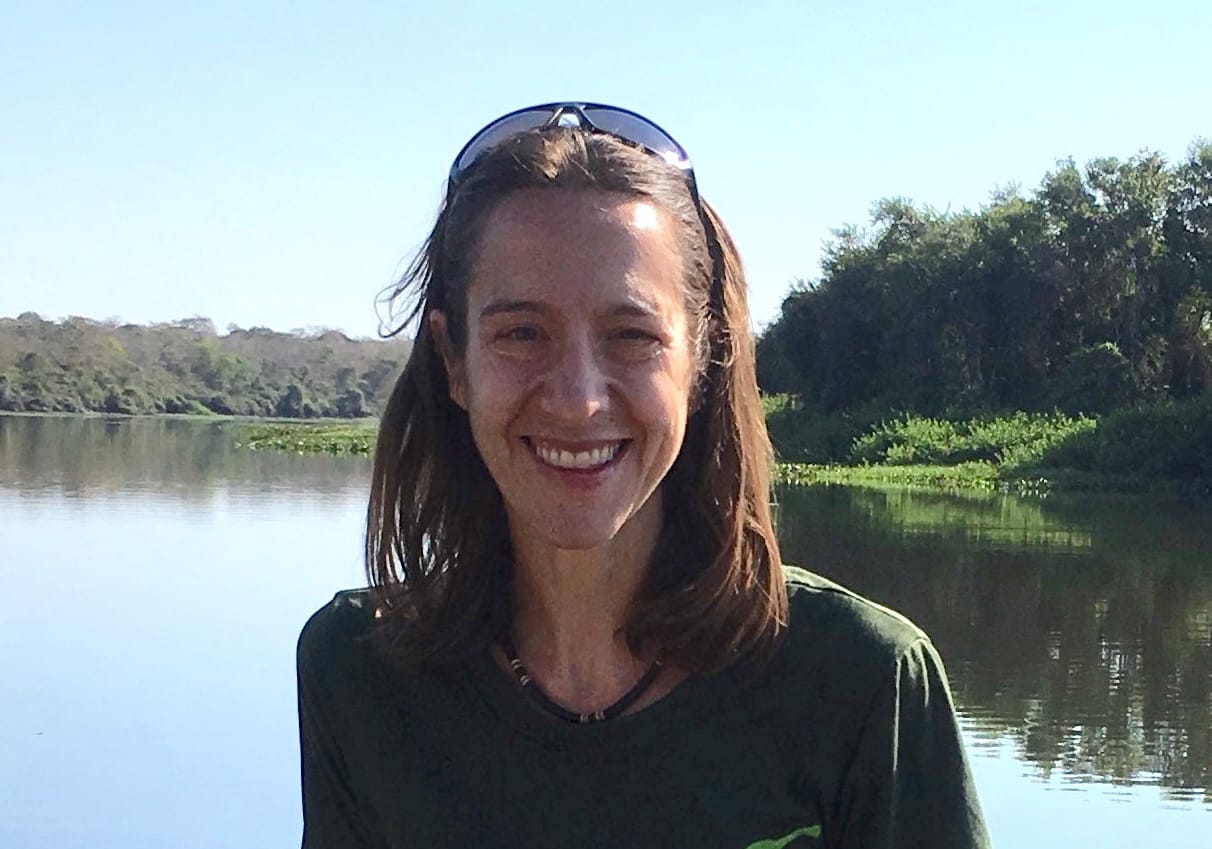How do you stop megafires?
Wednesday 3rd Nov 2021, 12.30pm
From California to Greece to Australia, it seems like every time we switch on the news there’s another wildfire report. Some fires are natural – in fact, they’re a fundamental part of many ecosystems – but the severity and frequency of the wildfires we are now witnessing is beyond natural levels. Human-ignited “megafires” are causing devastation across the planet. Climate change and inadequate ecosystem management are key contributors to the problem, but what are the possible solutions? In this special COP26 edition of the Big Questions Podcast, we ask Dr Imma Oliveras all about megafires.
Emily Elias: Each year, it seems like wildfire season gets worse and worse. Obviously, climate change is a huge factor in this, but is there anything else that we could be doing to make these megafires more manageable?
As global leaders meet in Glasgow for COP26, the UN Climate Change Conference, on this episode of the Oxford Sparks ‘Big Questions’ podcast, we are asking, how do you stop megafires?
Hello, I’m Emily Elias, and this is the show where we seek out the brightest minds at the University of Oxford, and we ask them the big questions. And for this one, we are headed to the great outdoors to sit amongst some trees at the university, with a researcher who has a keen eye on wildfires.
Imma Oliveras Menor: So, my name is Imma Oliveras. I’m a lecturer at the Environmental Change Institute, School of Geography and Environment at the University of Oxford.
Emily: And you study wildfires.
Imma: I do, yes.
Emily: These days, it feels a bit like you turn on the news, and there’s another wildfire.
Recording: With yet more intense heat in the US this week, forest fires in many western states can be seen from space.
Recording: After a week of what’s been called ‘apocalyptic fires’ raging across Greece, fire risk remains extremely high.
Recording: The ring of fire around Sydney is as angry and as frightening as we’ve seen. 20,000 people… (fadeout)
Imma: In the last few years, what we’ve seen is an increase in the large megafires of what is being called sixth-generation wildfires, which are wildfires of incredible energy and power. They produce huge smoke plumes that are able to self-feed the same fire, so, they create their own meteorological conditions to allow themselves spreading, and they are impossible, basically, to firefight until the meteorological conditions improve.
Emily: Where in the world are we seeing these fires? Everywhere?
Imma: Especially- more in certain areas. So, especially in California, in Australia; we’ve seen that. In the south of Europe, like we saw this year in Turkey and Greece, and also in Egypt, to some extent. Also in Chile, we are having some of these mega wildfires. In the Amazon, we are having a lot of increasing wildfires as well, but the drivers of those wildfires are different from the ones in these other regions.
Emily: So, looking at the ones in California and Australia and Greece and Turkey, what kind of damage are we seeing?
Imma: What we are seeing is wildfires spreading at an incredible power, very, very fast spread. So, they produce something that they call pyrocumulonimbus. So, they are producing walls of smoke that can go up to 10km high. And they’re impossible, so fast. So, they spread so fast that in a matter of hours, they can spread thousands of hectares, destroying anything they find in the way, basically: homes, lands, anything.
Emily: Are these particular areas that have been prone to fire in the past, or are we seeing new areas being really, kind of, ravaged by wildfire?
Imma: These areas in particular, they are what we call fire-adapted. So, it would be the natural ecosystem – usually they have Mediterranean type ecosystems – they would have a natural fire presence. But this fire presence is very different from the fire that we are seeing today. It would be a fire that we would occur every now and then, and with less intensity; they would not be that devastating as they are seeing today.
So, we are seeing them more frequently, but more importantly, more devastating, much more severe and powerful, than what would be natural.
Emily: Why is that, though? Is it just the big climate change elephant in the room?
Imma: In one side, yes. The climate change is to be blamed well by that. But also, there is an issue with management; that we have been not doing proper management in our landscapes.
Emily: What does ‘management’ mean?
Imma: So, management is planning some kind of measure to control what we call the biomass, and the way that the landscape is formed. So, when we look at the vegetation, when we’re talking in wildfire science, we call it that vegetation is fuel. So basically, it’s like when you do a fire at home, you would have to look for some logs to light the fire, and keep it running.
So, in a forest, you have this natural vegetation, which is the fuel for the fire. So, some type of management would be acting to reduce this fuel. So, for instance, you could apply a controlled burning during cold months or wet months, to reduce these fires, and you would have very low-intensity fires, but they would reduce the amount of biomass that you would have in those forests.
Or another type of management is creating firebreaks around urban areas. A firebreak; usually it’s, like, a big, wide path that you use to cut the spread of a fire. So, they are, like, safety. So, usually, naturally, roads could be acting as a firebreak; rivers could be acting as a firebreak. In certain conditions, depending on the topography and the type of forest that you have, for this managers might want to construct artificial big wide paths, to break the spread of the fire.
Emily: So, why have we become so rubbish at forest management?
Imma: I think that here, we are having a bit of a problem with politicians; that the management usually has been focused to act during or after the wildfire. We have a lot of management focused on- policy makers focused on providing tools to manage the fire during a wildfire. So, firefighting human resources, which are extremely important; trucks, planes, etc. Even after the wildfires, relief measures and things.
But what we have been failing at is to do management to prevent those fires; so, prevention; it’s what has been not happening. And one of the main reasons is because it’s not popular. Because it’s something that is not shiny; no one really looks at people cleaning the forest. But that is a very, very important task. But it’s not politically sexy right now, so…
Emily: Yes, I can see how a brand new fire truck is a nicer photo op than clearing out a bunch of gunk from the woods.
Imma: I think our politi- our leaders prefer- or see more flashy having a new truck or new aeroplanes to firefight the fires. What they don’t realise is in the current conditions, sometimes this type of technology can do little, when we have one of those big wildfires.
Then they also become so big because of climate change, so, we are having drier conditions, and also, usually, what we call the fire season is longer. So, it’s becoming longer, and usually when you get, at the end, to several months in a row, they accumulate, so, the vegetation becomes drier and drier, because it’s been hot and dry for the long time. So, when all the recipe pieces come together, you have these wildfires, and there’s no planes or trucks or human resources that can extinguish them.
Emily: So, are megafires here to stay?
Imma: Well, for a fire to happen, you need an ignition source, you need climate, and you need fuel. We can act on the climate to try to track down climate change, but that’s a bit of a more slow solution. But we can actually manage and act on managing our ignition sources. So, not putting anything that could cause a fire, like leaving glass in the forest, or a cigarette butts, or doing a barbeque when you need. And the other thing that we could do is manage this biomass, this fuel, to try to not have such accumulation ready for burning when a fire occurs, and when the conditions are favourable for burning.
Emily: Are all these fires bad? Are some of these fires good, and natural parts of the ecosystem?
Imma: Absolutely, yes. We have good fires and bad fires. Up to now, I have been talking about those bad fires, that would be these sixth-generation wildfires that we’ve been having with climate change. But of course, as I mentioned in the beginning, we have good fires. We have many, many ecosystems, like the Mediterranean ecosystems in the south of Europe, like the chapparal, the shrublands, of California, the tropical savannahs; they have natural fires, and they need fire to have their ecosystem functioning, and their processes and the biodiversity.
So, there are many, many species that can only germinate and release their seeds after fire. So, fire is a natural process; it’s very important. And it has been in the Earth’s system since, basically, we have been having oxygen and plants. So, yes, it is a natural component, and it is good when it’s happening in a managed, controlled way.
Emily: COP26 got the biggest policy makers all in one room, trying to hash out some plans for the future. If you could have five minutes of their time, what would be your plea? What would you like them to make a move on?
Imma: The problem with wildfires is that they are not there all the time. I mean, we have been having, now, major wildfires in California for four years in a row. But these happen within a few months. But then if there is a year that, for some reason, because the conditions are cooler, or there is more moisture and it has rained more, there are no such terrible wildfires, politicians forget. So, it drops out of the political agenda very rapidly.
So, it should become a sexy thing. It is a major concern, because it’s safety for the humans and wellbeing, and it destroys millions and millions of hectares. Like, the last four years, 12% of the Californian state has burnt. It has destroyed over 30,000 houses. Similar in Australia; even worse, it has destroyed 17m hectares, which is equivalent to 25m football pitches. Thousands of houses have been destroyed.
So, it is a concern. The thing is that it is not constant, it is not always there. But it should not be forgotten by the political agenda.
Emily: This podcast was brought to you by Oxford Sparks, from the University of Oxford, with music by John Lyons, and a special thanks to Imma Oliveras.
Tell us what you think about this podcast. You can go to Twitter and Tweet us @oxfordsparks. You can find us on Facebook, Instagram, YouTube; wherever. We are on the internet; just come and look for us.
You can also see some other cool stuff that we’re doing by going to our website: oxfordsparks.ox.ac.uk
I am Emily Elias. Bye for now.
Transcribed by UK Transcription.





